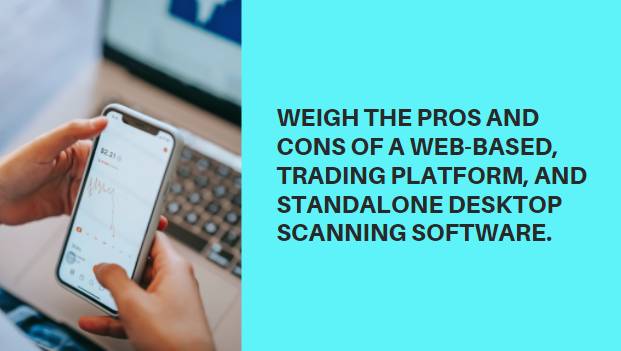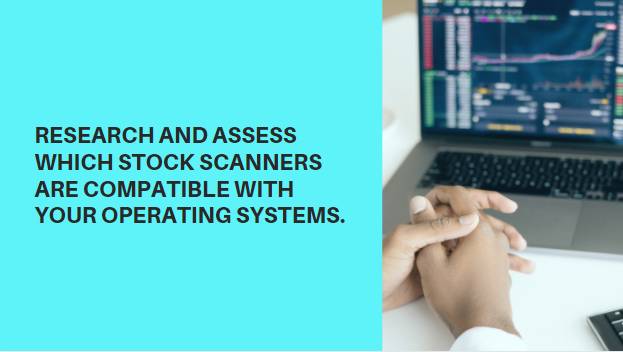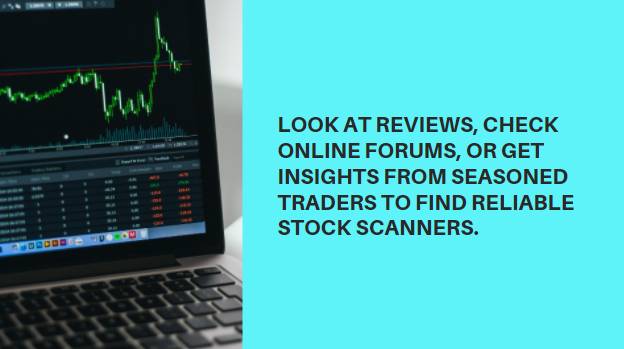Stock scanners are game-changing tools that help you spot trading opportunities quickly and easily.
However, not all stock scanners are created equal.
You’ll need to find the right scanner that can optimize your trading strategies and offer reliable features, from a user-friendly interface to multi-security research capabilities to help ensure you’re investing safely online.
This guide covers some of the essential features to consider when looking for a stock scanner to help you trade and invest effectively.
1. Stock scanner: What is it?
Stock scanners are software and tools that can filter stocks based on user-defined criteria.
The criteria can include technical and fundamental data points used to determine which stocks in the market are most relevant and potentially profitable for your trading and investing strategies.
For instance, if you’re only trading stocks under $20, you can add this criterion to your scanner to filter out all the stocks trading above $20. Adding more criteria allows you to filter out more noise.
Sorting through stock market data manually is almost impossible without using a scanning tool.
With the right stock scanner, you can go through countless stocks almost instantly and find the exact match to your criteria, saving you a lot of time and effort.
You can find stocks that make higher than average trading volumes or all-time-highs to any specific criteria you want to see in seconds.
Use stock scanners to ensure you don’t miss the most promising trading opportunities every day.
While all stock scanners are generally designed to help you find hot stocks, the tools have several distinctive features that may or may not suit your needs. This makes it crucial to find one that is ideal for your trading and investing strategies.
2. Where to access stock scanners
Various forms of stock scanners come at varying price points, and you’ll typically get what you pay for in terms of features.
Trading platform scanner. This is an embedded feature within the trading platform you use and is usually provided by your broker. It can range from a simple scanner with prebuilt scans to sophisticated with customizable and advanced scan criteria.
Web-based scanner. This is usually a subscription-based tool with the provider’s computer doing the heavy lifting and delivering the result to your browser. Web-based scanners are highly convenient, especially when accessing scans away from your desktop.
Standalone desktop scanning software.This allows you to program and input your criteria and control the dataset, giving you total control of your scanning.
However, standalone desktop scanning software tends to hog your system resources. This can cause you to run scans manually or limit your scans’ sample sizes to specific lists of kinds of stocks.

Ultimately, you can weigh each one’s pros and cons and find the best-fitting choice for your trading and investing needs.
3. Essential stock scanner features
A good approach to find the best-fitting stock scanner is to focus on what you need and how the tool can support your trading and investing strategies.
After all, scanners are simply tools that help you find the right stocks. You will need to set up your scans, so they align with your efforts.
That being said, below are several factors and features to consider when looking for the best stock scanner for you.
a. User-friendly interface
Delving into stock market data is no walk in the park, making it crucial to find a stock scanner that is easy to use. This way, you don’t pour out all your time and energy into learning how to use the tool instead of trading and investing strategically.
Choose a stock scanner software with a user-friendly interface to help you set up and run your scans efficiently. This expedites your scanning while allowing you to focus on crucial trading and investing aspects.
You won’t lose daylight while optimizing your resources and efforts to find the best trading and investing opportunities ultimately.
b. Platform Compatibility
As mentioned, scanners can be desktop software or web applications (among others).
Web apps don’t suck up as much of your computer resources and are convenient, while desktop platforms provide more advanced capabilities but can also hog your computer’s resources.
Whichever you choose, it’s important to ensure that they are compatible with your operating systems.
For instance, most scanners can work on Windows PCs (depending on the OS version), but only a few might work on Mac desktop computers.

Do some research and even check out stock market sites to assess which stock scanners are compatible with your devices, operating systems, and other relevant components and factors.
c. Scan Criteria
Essentially, your scanning criteria serve as filters that allow you to set up and implement efficient and successful scans.
Enter your criteria, and the scanning tool will do the work to deliver the best matching results, making effective filters critical to your every scan.
You can get the essential filters from most scanner software, but other scanning tools go a step further by letting you create more unique criteria.
For example, besides including criteria for volume and price, high-quality stock scanners can offer more unique metrics such as Revenue and other advanced technical indicators.
This allows you to get more granular with your scans and filter out more noise, increasing your chances of finding better trading and investing opportunities.
d. Integrations
Some stock scanner features and functionalities can go beyond the basics, with a few tools that work as standalone trading platforms.
These scanners with advanced features can include news, charts, and even Level 2, a service that displays real-time information on market depth and momentum to investors and traders.
Other stock scanners also provide broker integrations. With this, your scanner can already replace your trading platform. This is beneficial if you don’t have access to a quality trading platform yet.
e. Reliability
Like any other software, your stock scanner must be reliable, or you’ll end up getting frustrated if it stops working properly or experiences errors right in the middle of scanning volumes of data.
For example, software bugs can cause your scanner to crash, which can seriously impact your trading and investing efforts.

Again, it’s crucial to conduct some comprehensive research. Go on online forums, check out stock scanner software reviews, or even ask other seasoned traders so you don’t end up with a tool you regret investing in.
Final thoughts
The right stock scanner can streamline, cutting through the market’s noise, allowing you to find and focus on the most qualified candidates more efficiently.
Various stock scanners offer distinct and varying features, so assess what you need and find ones to address those needs. Determine if the tool can provide you with accurate and reliable results.
Do what you can before investing in a stock scanner. Research, look at reviews and even test how well a scanner works (if possible) to ensure you get what you’re looking for.
Tech Trends
Related posts
Leave a Reply Cancel reply
Hot Topics
Categories
- Ads (5)
- Animes (25)
- Artificial Intelligence (AI) (35)
- Augmented Reality (AR) (10)
- Automotive (9)
- Bitcoin (16)
- Blockchain (24)
- Business (244)
- Business Intelligence (3)
- Cloud Computing (23)
- Computer (128)
- Concrete Technology (1)
- Cryptocurrency (10)
- Cybersecurity (42)
- Data Science (9)
- Database (4)
- DevOps (6)
- Digital Marketing (76)
- Digital Workplace (14)
- Ecommerce (1)
- Education (28)
- Electric Vehicle (EV) (1)
- Electronics & Hardware (17)
- Entertainment (42)
- Fabrication (3)
- FAQ's (1)
- Finance & Marketing (47)
- Gadgets (35)
- Games (8)
- Gear (29)
- HTTPS (1)
- Industry (46)
- Information Technology (90)
- Internet (413)
- Internet of Things (IoT) (41)
- Job (25)
- Machine Learning (6)
- Marketing (92)
- Mobile Apps (21)
- Movies (11)
- Natural Language Processing (6)
- News & Trends (109)
- Programming (4)
- Science & Technology (235)
- Security (81)
- SEO (56)
- Services (36)
- Social Media (73)
- Software (99)
- Sports (1)
- Technology (306)
- Telecom (6)
- TikTok (5)
- Tours & Travels (9)
- Uncategorized (11)
- Virtual Reality (VR) (7)
- VoIP (4)
- Web Technology (42)
- Workforce (17)
- Workspace (6)



Stay connected